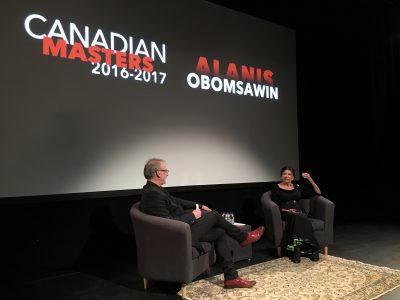
The acclaimed documentary filmmaker Alanis Obomsawin sat for a captivating conversation as the guest of honour for the second Canadian Masters celebration on Thursday, January 26 at the Arts Court Theatre in downtown Ottawa.
Following Atom Egoyan’s visit in November, Obomsawin participated in a conversation with Tom McSorley, president of the Canadian Film Institute (CFI), and stayed for a Q&A period after.
Canadian Masters is a series of conversations with Canada’s most accomplished and celebrated filmmakers hosted by the CFI, in collaboration with Carleton University’s Film Studies department. The Film Studies program is celebrating its 40th anniversary this school year, and their Assistant Director Marc Furstenau was on hand to say a few words.
“The first film courses were offered in the academic year of 1976-1977. I have some facts to give you about this program – facts, mind you, not alternative facts,” Furstenau joked. “The idea then was that the cinema was a medium worth studying in a scholarly way. It has been going strongly ever since.”
As for Obomsawin and her significance in this country, Furstenau said, “Throughout the history of this program, Canadian cinema has been a central part of its mission. This is a rare opportunity to speak with and ask questions of one of, I think it’s fair to say, Canada’s pre-eminent filmmakers.”
“We’re very pleased to be co-hosting the event tonight.”
To introduce Obomsawin before screening a series of clips from her films, McSorley said, “Such is the enormous achievement of our Canadian Master guest tonight, if we’d even started this series 20 years ago, she’d still have been designated a Canadian Master.”
Thankfully, their conversation was wide-ranging and touched on periods throughout her entire career, including her start as an educator. The 84-year-old shared that from the beginning of her career at the National Film Board in 1967, where she has remained ever since, she chose topics that were a challenge and a bit of a provocation.
“I was a problem,” she said. “I’ve never made an easy film. If you want to be a good documentary filmmaker, you have to be prepared. Some are going to love you and some are going to hate you. It’s very difficult, politically. You have to make sure this is what you want to do, because you believe in it and because you want to see justice and change. For me, it all has to do with love and inclusion. We’re all beautiful. It’s love that makes all the change.”
She spoke of her upbringing, and about the history of how Indigenous people in Canada have been treated by a country that claims to be tolerant and progressive.
“You start thinking it’s normal to get beat up, to be insulted, that your language is a devil’s language,” she said to a silent room. “You start believing it. They told us: this is not your name, this is not your language, this is how you think and how you pray. But we’re not that.”
Much like her time as an educator, when she said she would go in the classroom and tell students a different story that didn’t adhere to the party line, her approach to filmmaking is one of political action. She inserts her subjective presence, particularly her voice, into her films, because she is searching for justice.
“If I didn’t think what I do created change and made for better lives, I’d be lying down resting,” she explained.
“We still have a lot of problems, a lot of suicide. But it’s much higher than hope what I feel. I’m not saying it’s easy, but anything is possible. If you really want to, and you’re prepared to work, you can do it.”
With that, McSorley said he couldn’t top that as a final message, and several audience members asked questions or shared how deeply thankful they are for Obomsawin’s voice and for her films.
The next night, Obomsawin was present in Richcraft Hall Theatre at Carleton University to screen her latest film, We Can’t Make The Same Mistake Twice, which is about a human-rights complaint by a group of activists charging that the federal government’s harmfully inadequate funding of services for Indigenous children constituted a discriminatory practice.
On March 30 and April 1, filmmaker Guy Maddin will be the final guest for this series of Canadian Masters. Stay tuned for more details about Maddin’s visit.